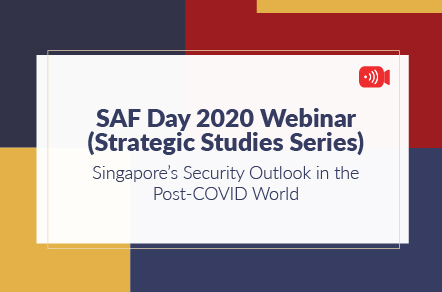

RSIS, together with the Centre for Strategic and International Studies (CSIS) from Indonesia and the National Graduate Institute for Policy Studies (GRIPS) from Japan, co-organised three webinars between July and September 2020. The first webinar on “Post-Pandemic Indo-Pacific: Prospect for Regional Cooperation” was delivered by former Indonesian Foreign Minister, Dr Marty Natalegawa on 28 July 2020. The second webinar on “COVID-19 in Asia: Navigating Geopolitical Risks amid Unprecedented Disruptions” was delivered by Prof Mely Caballero-Anthony, Professor of International Relations and Head of the Centre for Non-Traditional Security Studies at RSIS on 18 August 2020. The last webinar on “Strengthening Resilience of Supply Chains in the Indo-Pacific Region: Towards Economic Growth in the Post-Pandemic Era” will be held on 10 September 2020.
Post-Pandemic Indo-Pacific: Prospect for Regional Cooperation
On 28 July 2020, CSIS, GRIPS and RSIS held a joint webinar on the topic “Post-Pandemic Indo-Pacific: Prospect for Regional Cooperation” with a presentation delivered by former Indonesian Foreign Minister, Dr Marty Natalegawa.
Mr Jusuf Wanandi, Vice Chairman, Board of Trustees, CSIS Foundation, Ambassador Yutaka Iimura, Senior Fellow, GRIPS Alliance, and Amb Ong Keng Yong, Executive Deputy Chairman of RSIS, delivered opening remarks. Over 300 participants from various countries participated in this webinar, which was moderated by Dr Philips Vermonte, Executive Director, CSIS.
In his presentation, Dr Natalegawa’s key focus was on the geopolitical ramifications of the COVID-19 crisis. He said that this pandemic has not only reinforced and accelerated the reality of a sharpened and more intensified rivalry between the United States and China, conflicts across the world have also continued despite calls by many for ceasefires during this pandemic.
This pandemic has also reminded us that there is a convergence between the local, national, regional, and global levels. It has clearly shown that many issues in the political-security, economic, social, and health sectors are intertwined.
He advocated an inclusive type of regional cooperative response, in which countries must have a common outlook to deal with the increasing geopolitical risks and dynamics competition. If the region is to become transformative and anticipative in its outlook, then it must devise a new modality to deal with the problems of this era.
Dr Natalegawa suggested that multilateralism must be defined in a different way — a way in which all stakeholders ranging from governments, businesses, NGOs, academia, and think tanks work together in adopting a whole-of-society approach to tackle increasingly complex problems.
COVID-19 in Asia: Navigating Geopolitical Risks amid Unprecedented Disruptions
On 18 August 2020, Prof Mely Caballero-Anthony, Professor of International Relations and Head of the Centre for Non-Traditional Security Studies, spoke on “COVID-19 in Asia: Navigating Geopolitical Risks amid Unprecedented Disruptions” for the CSIS-GRIPS-RSIS Webinar Series. She began with a few observations about the challenges posed by COVID-19. As a “Black Swan”, it had immediate physical disruptiveness to everyday life, but one should be mindful that past Black Swan events such as 9/11 had led to major political and security shifts globally. She also pointed out that the disruption was both massive and long-lasting, with several states struggling to come to terms with it. The costs and challenges were still not fully known, and both science and research had to play catch up. Finally, COVID-19 had emerged during major ongoing international changes, and in this part of the world, these changes were in the context of the changing Asian security landscape.
These observations had led to the rethinking of several assumptions. First, the United States had struggled to exercise the critical role it had played in providing traditional security in Asia when it came to the pandemic, despite its expertise and institutions that had led global efforts such as SARS and H1N1 in the past. Second, Asia had been the centre of world growth for the last few decades but the pandemic was hitting it very hard, especially SMEs. China’s new assertiveness contrasted with its rhetoric of upholding a rules-based order led to a growing trust deficit between China and the region. Finally, ASEAN’s institutions had enjoyed a presumption of centrality but it needed to ask itself if this narrative was still compelling amid rising tensions.
ASEAN can do more, and it needs to take more initiative to work on the access to therapeutic drugs and vaccines. It can work with global alliances on vaccine access while strengthening its institutional and indigenous research and production capacities to ensure access based on health criteria rather than the wealth of the recipients. This can also include an ASEAN Centre for Disease Control. In doing so, ASEAN can reaffirm its centrality in a meaningful way.



















